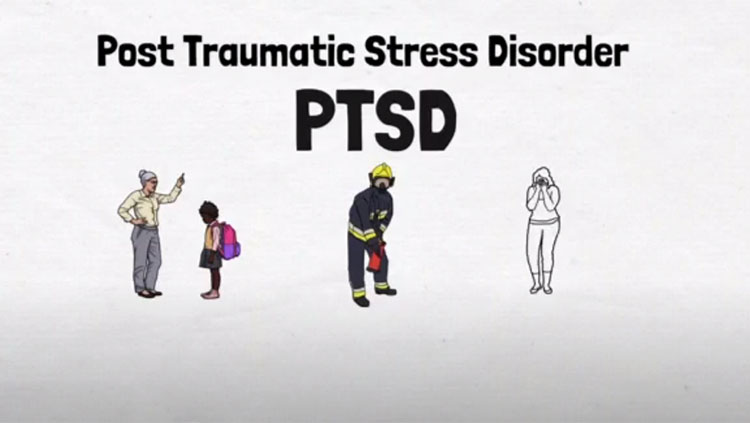The Brain Inflamed
- Published26 Feb 2015
- Reviewed26 Feb 2015
- Source The Dana Foundation
Scientists have known for a while now that inflammation contributes to long-term neurodegenerative conditions such as Alzheimer’s and Parkinson’s diseases. But lately they have been turning up evidence that inflammation can affect the brain more directly and acutely, and might underlie a wider range of problems, from impaired cognition during infections to depression and even schizophrenia.
“We’re still trying to delineate what the underlying mechanisms might be,” says Robert M. Buchanan, a researcher at the University of Maryland who is setting up a clinical trial of anti-inflammatory drugs for schizophrenia.
Inflammation and cognition
People typically don’t feel “100 percent,” cognitively, when they have a cold or flu infection. That commonplace observation has long hinted that inflammation—a major part of the body’s response to such infections—might play a role in the rapid, short-term lowering of cognition. And although it’s inherently difficult to isolate the precise factors that affect cognition amid the storm of molecular changes that occur during inflammation, scientists have been making progress using a variety of approaches.
In a study published last March, for example, researchers at the University of Illinois at Urbana-Champaign showed that when newborn piglets were exposed to a respiratory virus, immune cells (microglia) in the hippocampus—an important memory-related brain region—bore unmistakable signs of activation, compared with those of control animals. The expression of inflammatory genes also increased, across the brain, and the infected animals performed significantly worse on spatial memory tests. Even three weeks after their infections began, the piglets’ microglia were much more activated than those of control animals.
Brain inflammation models that don’t use viruses have also been informative. In 2012 researchers in the laboratory of Susanna Rosi at the University of California–San Francisco used lipopolysaccharide, a bacterial protein, to induce neuroinflammation in rats, i.e. causing a surge in microglial production of the pro-inflammatory factor TNF-α. They soon observed hippocampus-related cognitive deficits in the animals. They also were able to reverse these cognitive deficits, and greatly reduce the inflammation, using a compound that inhibits TNF-α production.
People with cancer are known to have impaired mood and cognition, even before they are diagnosed. A group of Korean researchers reported in February that as experimentally induced tumors grew in mice, levels of inflammation markers went up in their hippocampi—and the mice showed increased depression-like behavior and impaired object recognition. Inflammation can spring from obesity too: In March, Australian researchers reported that a high-fat, high-sugar diet increased the signs of inflammation in the hippocampi of rats, who performed worse than controls on spatial memory tests.
How does inflammation alter cognition? That’s the key question now for researchers, as evidence for the effect accumulates in the literature.
Looking for reasons
Karim Belarbi, lead author of the 2012 UCSF paper and now based at the French research institute INSERM, says that “one of the impacts we saw was an elevated proportion of neurons getting activated in response to behavior.”
One hypothesis for this, he adds, is that elevated TNF-α increases levels of AMPAR—a neuronal receptor for an excitatory neurotransmitter called glutamate. More glutamate receptors means more sensitivity to glutamate in the surrounding tissue, which in turn makes the neurons more liable to being activated by stimuli, and eventually too much so. Another possible route to excessive activation, Belarbi says, is that TNF-α-mediated inflammation alters the properties of helper brain cells called astrocytes, which normally regulate glutamate levels,; the loss of that glutamate regulation could lead to a buildup of the neurotransmitter and, again, an oversensitization of neurons.
Note that neuroinflammation, according to these hypotheses, impairs cognition by causing the overactivation of neurons. “If you want to have good cognition, you need neuronal activation at the optimum level,” Belarbi suggests. “I like to think of it in terms of a signal to noise ratio: Too little neuronal activation means the signal is too low. Too much neuronal activation means the noise is too high. Either way you will lose cognition.”
Other hypothesized effects of inflammation that would impair cognition include suppression of the production of new hippocampal neurons (neurogenesis), and reduction in microglial cells’ normal ability to help repair and maintain neuronal connections (synapses).
Short-term and long-term
Remarkably, inflammation also seems to impair cognition via a long-term, apparently epigenetic mechanism. A study reported in January found that female mice whose immune cells produced little or no TNF-α had lower levels of associated inflammatory proteins in their milk. As a result, their offspring had higher levels of hippocampal neurogenesis and better spatial memory—not just temporarily but all the way into adulthood. The apparently beneficial effect (which might occur to some extent in humans too, if they could avoid inflammation during pregnancy) was reversed when the researchers artificially restored normal levels of the TNF-α-associated inflammatory proteins to the milk consumed by the mouse pups.
Miklos Toth, the researcher at Weill Cornell Medical College whose laboratory conducted that study, notes that the higher levels of neurogenesis were associated with altered gene expression levels in hippocampal neurons, compared to the pups from normal-TNF-α mothers. That suggests that the TNF-α-related cytokines in milk somehow got through the mouse-pup gut (“neonatal gut does not have, or has low levels of, the enzymes that normally digest proteins,” Toth says) and into the pups’ brains. There the cytokines, or their relative absence, somehow ended up programming a higher level of neurogenesis into the adult gene expression patterns in hippocampal neurons. “These gene expression changes seem to underlie/explain the cognitive alterations,” says Toth.
Mood disorders and psychosis
Perhaps unsurprisingly, given the effects of inflammation on cognition-related brain regions, inflammation also has been found to disrupt mood.
In an experiment reported in 2001, for example, researchers injected human volunteers with small doses of a toxin from Salmonella bacteria—enough to cause a hardly noticeable (0.5 degrees Celsius) rise in body temperature, but with no apparent effect on blood pressure or pulse rate. Bloodstream levels of pro-inflammatory proteins such as TNF-α and IL-6 rose significantly, however, and as the researchers noted: “the subjects showed a transient significant increase in the levels of anxiety … and depressed mood” and “[v]erbal and nonverbal memory functions were significantly decreased …”
That and more recent experiments have suggested that inflammation may even cause mood disorders that require treatment. As the authors of a 2010 review wrote, “it has been established that pro-inflammatory cytokines induce not only symptoms of sickness, but also true major depressive disorders in physically ill patients with no previous history of mental disorders.” There is even some evidence for a connection between inflammation and depression-related suicidality.
Reducing inflammation to raise mood?
All that has prompted scientists to start looking at anti-inflammatory therapies as possible adjunct treatments for depression, a condition that often fails to respond to first-line drugs that boost serotonin and norepinephrine signaling. In a 2006 study, for example, German researchers found that depression patients taking the anti-inflammatory drug celecoxib plus the antidepressant reboxetine improved significantly more than patients taking only reboxetine. A 2012 study—a cross-sectional study using medical records—hinted that even aspirin might have a meaningful impact in preventing depression. Researchers don’t yet understand precisely how inflammation could lead to depression, let alone how that mechanism could best be targeted by drugs, but they are now testing a variety of anti-inflammatory strategies in the hope of finding one or more that work consistently well.
Inflammation’s effects on mood may go beyond the promotion of depression. In the 2001 report mentioned above, volunteers injected with Salmonella toxins showed surges of the hormone cortisol, a marker of stress, and experienced anxiety in addition to a depressed mood. More recently, in a study reported in February of this year, researchers compared people with an anxiety- and stress-related condition called “intermittent explosive disorder” and normal subjects, and found significantly higher levels of two key markers of inflammation, C-reactive protein and IL-6, in the former group. They also found a strong correlation between these inflammation signs and subjects’ histories of aggression.
The psychiatric literature suggests that there can be a substantial overlap in risk factors and clinical presentation for some mood disorders and psychoses—perhaps the best example being bipolar disorder and schizophrenia, which are often confused by doctors. In recent years, both bipolar disorder and schizophrenia have been linked to inflammation.
Arguably the most compelling evidence for this association has to do with inflammation in utero or in early life. Both bipolar disorder and schizophrenia have been linked to childhood autoimmune diseases as well as maternal infections or inflammation during pregnancy. For example, a study published last year, based on data from thousands of California women who gave birth during 1959-1966, found that the children of women who reported a flu infection during pregnancy had proportionately four times as many diagnoses of bipolar disorder in later life. Genetic studies also suggest that at least some of the susceptibility to such diseases lies in gene variants related to immunity and inflammation.
It may be that inflammation sets the developing brain on course for these disorders so many years before symptoms appear that it is no longer especially relevant once mental illness is diagnosed. Anti-inflammatory treatments for schizophrenia, for example, so far haven’t shown a great deal of efficacy in clinical trials.
Yet there is some evidence that immune abnormalities persist in the brains of people with these disorders. Recent studies have found, for example, that cognitive impairments in schizophrenia patients correlate with markers of inflammation. Other studies have found such markers in schizophrenia patients when they first present with acute psychosis. Similarly, a study reported this past March linked psychosis in bipolar disorder to a gene variant associated with higher levels of kynurenic acid. The latter protein, which is now thought to play some role in cognition and psychosis, is also found at high levels in inflamed brains during infections.
Scientists therefore are still looking for anti-inflammatory drugs that can cross from the bloodstream into the brain and affect such pathways beneficially. At the University of Maryland, Robert Buchanan is casting a relatively wide net with a trial in schizophrenia patients, just now starting, of three separate agents with three separate modes of anti-inflammatory action: salsalate, a relative of aspirin; omega-3 fatty acids; and fluvastatin.
“We thought that a combination of three agents with different mechanisms would provide a robust test of the hypothesis that anti-inflammatory agents might be useful,” Buchanan says.
- By Jim Schnabel
CONTENT PROVIDED BY
The Dana Foundation is a private philanthropic organization that supports brain research through grants and educates the public about the successes and potential of brain research.
Also In Mental Health
Trending
Popular articles on BrainFacts.org


















